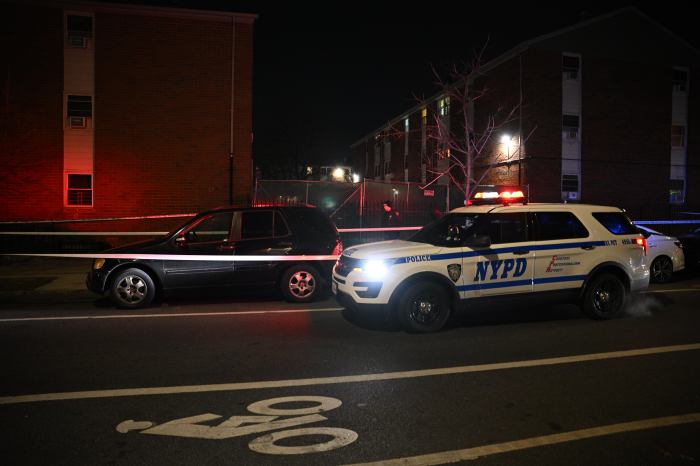By Kathianne Boniello and Courtney Dentch
The National Transportation Safety Board has begun investigating a derailment of the AirTrain at Kennedy Airport Friday which killed a 23-year-old Jamaica man who was crushed by weights inside the first car during a test run of the light rail line.
Kelvin DeBourgh, who worked for Bombardier, the Canadian company that built the AirTrain cars and has been testing the system, died at Jamaica Hospital about three hours after the 12:25 p.m. accident in which he was pinned up to his waist.
The construction of the AirTrain had been ahead of schedule with service to Howard Beach expected to begin later this year and service to Jamaica station to start by spring 2003.
The National Transportation Safety Board, which usually does not investigate accidents on projects until passenger service has begun, decided to lead the probe into the AirTrain after the conductor died.
Officials of the Port Authority of New York and New Jersey, which operates the three metropolitan airports, said the opening of the AirTrain service may be delayed.
It was not clear what impact the accident would have on the future of the AirTrain or the ambitious plans for development of both downtown Jamaica and Kennedy Airport that have been tied to the new rail connection.
The three-car derailment wiped out a 150-foot section of the concrete sidewall on the elevated track built to accommodate the AirTrain, and police, fire and emergency rescue workers had to carefully extricate the pinned man from under 8,000 pounds of weights used in the tests to simulate passengers. The train derailed near the Federal Circle section of JFK.
It was the second reported AirTrain accident, according to officials, who said there was a minor incident in July when two AirTrains grazed each other. A Port Authority spokesman said three AirTrain workers were slightly injured in the July accident.
Although the AirTrain was designed to be operated automatically without an engineer, a spokesman for Bombardier told a Friday news conference that DeBourgh, a nine-month employee of the company, was manually operating the train during the test.
A worker on the scene said the weights used in the test shifted while the AirTrain rounded a curve in the track, pinning DeBourgh inside the car.
In Washington, a spokeswoman for the National Transportation Safety Board said the agency was investigating whether or not the concrete blocks used in the test were strapped down.
“Our initial information is that they were not secure at all,” said NTSB spokeswoman Lauren Peduzzi, who said there were eight concrete blocks in each of the three AirTrain cars.
The $1.9 billion transportation system will connect the airport with Long Island Rail Road service to Manhattan at Jamaica station. All LIRR train lines except the Port Washington branch as well as the E, J, and Z subway lines and more than a dozen bus lines meet at the station. Passengers going to Howard Beach will be able to connect with the A subway line.
Despite some opposition from the southeast Queens community, the AirTrain has been viewed as a way to revive the economy of downtown Jamaica by bringing air travelers as well as airline and airport employees into shops and offices in the area.
Critics of the project had voiced skepticism about air travelers’ willingness to change to the LIRR at Jamaica Station for the second leg of the journey into Manhattan. But the project received reluctant approval along the way because public officials believed Kennedy Airport had to remain competitive to sustain Queens’ economy.
“This is proven technology,” Bombardier spokeswoman Carol Sharpe said Tuesday about the AirTrain. When asked if Bombardier had any qualms about its safety record with AirTrain-type projects, Sharpe said “absolutely not.”
Bombardier is a transportation giant, producing everything from transit, railroad and subway systems and cars to aircraft and boats.
Port Authority officials said at a news conference Friday afternoon that the opening of the Howard Beach line, which had been scheduled for October, may be pushed back.
“We don’t know,” said Anthony Cracchiolo, director of Priority Capital Projects for the Port Authority when asked if the opening of the AirTrain would be delayed. “We don’t know how much we have to do to repair it and when we want to resume testing.
“Our top priority has always been on the system to ensure safety,” he said. “We are entering into a thorough investigation with the contractor as to why it occurred.”
Derek Winton, a Bombardier executive, said Friday’s tests were part of the AirTrain’s normal testing program.
“There were some weights on board,” he said in response to reporters’ questions. “The car was loaded to … represent a certain number of passengers — probably about 60 percent full.”
The system must complete 30 days of testing without incident before it can open to passengers.
Sharpe, who said Bombardier officials have been in touch with DeBourgh’s family, said the company has been cooperating with the National Transportation Safety Board and the Port Authority to determine the cause of Friday’s fatal accident.
“We have 125 experts in engineering, safety and project management on site,” Sharpe said. “We’re very saddened by the accident. It’s a tragedy.”
Reach reporter Kathianne Boniello by e-mail at Timesledger@aol.com or call 229-0300, Ext. 157.

































